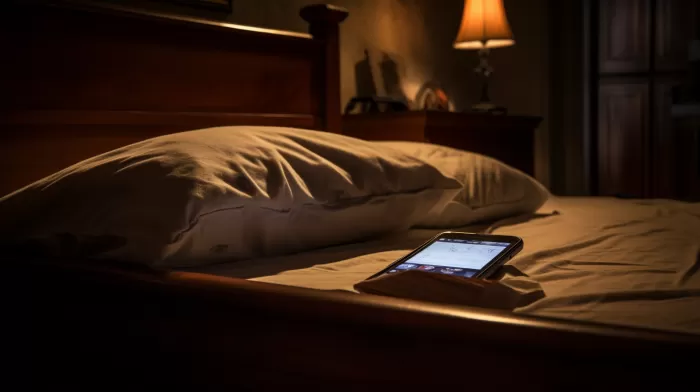You may have heard about the potential dangers of cellphones, from distracting driving habits to potential radiation exposure. However, there’s another concerning cellphone habit that may be harming your brain: sleeping with your cellphone nearby and letting it disrupt your sleep.
A new study conducted at the California Pacific Medical Center Research Institute (CPMCRI) in San Francisco discovered fragmented sleep and lower sleep efficiency were linked to a 40 to 50 percent increase in serious memory and learning problems over the course of the four-year study. To prevent this potential risk to your brain health, it is crucial to learn more about the research and discover how to create better sleep habits.
The Connection Between Sleep Disruption and Cognitive Decline
The research at CPMCRI involved more than 2,800 older men with a mean age of 76 years. While the exact methods used relied on participants self-reporting their levels of nighttime disturbance and sleep quality, the researchers found a significant connection between poor sleep quality and cognitive decline.
Terri Blackwell, one of the researchers involved in the study, emphasized, “It was the quality of sleep that predicted future cognitive decline in this study, not the quantity.” Given the high prevalence of sleep problems in the elderly, understanding how sleep affects cognitive health is essential for prevention and early intervention efforts.
The Importance of Good Sleep Environment
To maximize the quality of your sleep and protect your brain from potential decline, it is crucial to pay attention to your sleep environment. One important factor is ensuring that your bedroom is entirely dark, quiet, and free of electronic devices such as cellphones.
Eliminating electronic devices from the bedroom is essential in improving sleep quality for several reasons. One of the most obvious is that noises and vibrations from incoming messages or alerts can easily interrupt your sleep, leading to fragmented rest and reduced sleep efficiency.
Additionally, the blue light emitted from cellphone screens has been shown to suppress the body’s production of melatonin, the hormone that promotes sleep. This can make it harder to fall asleep and potentially contribute to sleep disorders such as insomnia.
To further promote a sleep-conducive environment, some experts recommend dimming the lights in your home approximately one hour before bedtime. This gentle shift in lighting can help signal to the body that it’s time to wind down and prepare for sleep.
Establishing Healthy Sleep Habits
Besides creating an electronics-free sleep space, consider implementing some of these additional sleep-promoting habits:
- Establish a consistent sleep schedule: Going to bed and waking up at the same time each day, including weekends, can help regulate your body’s internal clock and improve overall sleep quality.
-
Create a calming bedtime routine: Engaging in a calming activity, such as reading, meditating, or taking a warm bath before bedtime can help your body relax and signal that it’s time to sleep.
-
Limit caffeine and alcohol intake: Consuming excessive amounts of caffeine, especially in the afternoon, can disrupt sleep. Similarly, while alcohol may temporarily induce drowsiness, it can also fragment sleep, reducing overall restfulness.
-
Be mindful of your diet and exercise habits: Eating large meals or engaging in high-intensity exercise too close to bedtime may make falling asleep more difficult. Aim to maintain a balanced diet and exercise earlier in the day, ideally several hours before bedtime.
-
Seek treatment for sleep disorders: If you suspect you have a sleep disorder, such as insomnia or sleep apnea, consult with a healthcare professional to identify the appropriate treatment plan.
The connection between sleep disruptions and cognitive decline is significant, particularly as we age. By implementing these suggestions and promoting a healthy sleep environment, you can help protect your brain from the potential damage caused by poor sleep habits. Sleep is a vital component of overall wellbeing – don’t let the distractions of modern technology interfere with the restorative rest your mind and body need.



